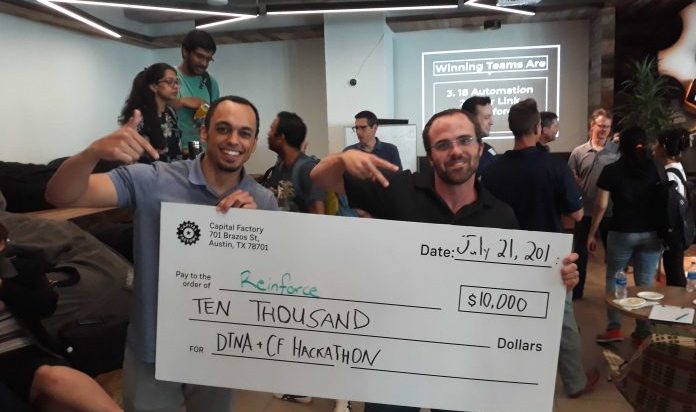A Friendship Yields a Championship: Two SMU Coding Boot Camp Students Win Major Hackathon

Kyle Foster and Taylor Lewis each had very different roads to coding boot camp. Despite these differences, the experience not only brought them together as friends but also sparked a professional partnership—one that would lead them to win the Daimler Truck North America Hackathon only a few months later. With Kyle doing back-end development and Taylor handling the front end, they work as a perfectly balanced team strengthened by friendship. “We’re like peanut butter and jelly,” said Kyle, laughing. “The dynamic just works for us.”
Tell us a little bit about how each of you ended up pursuing boot camp.
Kyle Foster: I had a pretty unexpected road to boot camp. I had never been interested in coding before, but my partner at the time was pregnant. When the baby was born, I realized I wasn’t making enough money to support us. I started researching jobs that made more than $60,000 a year, and I noticed most of them involved coding. A few days later, I signed up for the SMU Coding Boot Camp, powered by Trilogy Education. I never liked the idea of a desk job—I had always done management or blue-collar labor. I didn’t know what to expect, but I figured it’d be less physically tiring with a greater payoff.
Taylor Lewis: Prior to boot camp, I was working at a staffing firm in Austin, Texas. For most of the workday, I recruited software developers. I talked to them a lot about what they did and found it to be really interesting. I started taking some free online courses and getting more familiar with reading code. Eventually, I decided to really pursue it myself and enrolled in the SMU Coding Boot Camp.
How was the boot camp experience for you both?
Kyle Foster: It was tough not knowing anything beforehand, but I liked the pace of it. It kept me on my toes without completely drowning me. Taylor and I would get together on Friday nights before assignments were due and make sure our work was up to par; that teamwork was how we really started being developers.
Taylor Lewis: We can’t say enough about the instructors. They were the best instructors possible. The amount of time they put into each student was incredible, and we attribute a lot of our success both in the program and at the hackathon to all of them. They were awesome and we won’t forget the impact they’ve had on us. They cared about what they did, and they made sure we always understood the material. After the hackathon, when we were working on refining our app, we put a question out on our LinkedIn network. One of our instructors, Bruce Van Horn, posted an answer that ended up making a big difference. He’s a great guy—he understands what teaching is all about.
Let’s talk about the hackathon. How was that experience?
Taylor Lewis: I decided on a whim that I wanted to do this hackathon. Kyle and I signed up with a team of boot camp students, and we ended up winning. Most of the other contestants there were experienced developers from established companies. They had been in the field for eight to ten years, and they were capable of crazy stuff. But what the hackathon asked for was a voice-enabled application that would give truck technicians information on how to work. It would keep track of their time spent working and how long each step took—gathering data the whole time to improve the system overall. So while the other teams were doing higher-level code, we gave them what they wanted.
What was the highlight of the hackathon experience for each of you?
Taylor Lewis: It was really awesome for our group of students to win against the senior developers—we beat about 20 or 30 other teams.
Kyle Foster: For me, the best part was being able to work with all the different technologies that we used. We essentially built a whole project in just two days, and it was a really cool experience to work with a team in that way.
What are you both up to now?
Kyle Foster: I have been working really hard on continuing to build and fine-tune the application we created at the hackathon. It’s been a bit of a roller coaster trying to secure funding, but I’m thankful to have something great to add to my resume. I’m in the process of revamping my portfolio, and I’m going to start looking for a job doing back-end web development soon.
Taylor Lewis: I recently started my first developer job—at Jonah Digital Agency in Southlake, Texas. It’s a contractor role for front-end web development, and it’s really allowing me to learn as I go. I love it. Going forward, I want to keep getting better at my job and in my field. Kyle and I still work on our software together at least twice a week. We meet at Starbucks or at his coworking space.
What’s the best piece of advice you would give someone looking to enroll in a boot camp?
Kyle Foster: Well, of course there’s the cliched advice about persistence—and it’s all true. But I’ve also learned that coding is a love-hate relationship: you have to find what you’re comfortable with and what you enjoy most. Learning the full stack—both the front and back end—is so important, but to have a specialty within that is what can really bring you ahead.
Taylor Lewis: Always keep at trying to figure out problems. Do a lot of studying, build a lot of projects on your own, and keep failing. The more you fail, the better chance there is that you’ll succeed in the future.

 Live Chat
Live Chat